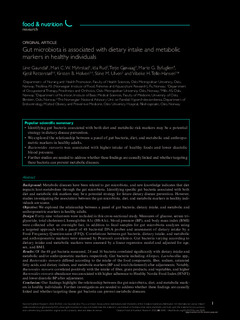| dc.description.abstract | Background: Metabolic diseases have been related to gut microbiota, and new knowledge indicates that diet impacts host metabolism through the gut microbiota. Identifying specific gut bacteria associated with both diet and metabolic risk markers may be a potential strategy for future dietary disease prevention. However, studies investigating the association between the gut microbiota, diet, and metabolic markers in healthy indi-viduals are scarce.Objective: We explored the relationship between a panel of gut bacteria, dietary intake, and metabolic and anthropometric markers in healthy adults.Design: Forty-nine volunteers were included in this cross-sectional study. Measures of glucose, serum tri-glyceride, total cholesterol, hemoglobin A1c (HbA1c), blood pressure (BP), and body mass index (BMI) were collected after an overnight fast, in addition to fecal samples for gut microbiota analyzes using a targeted approach with a panel of 48 bacterial DNA probes and assessment of dietary intake by a Food Frequency Questionnaire (FFQ). Correlations between gut bacteria, dietary intake, and metabolic and anthropometric markers were assessed by Pearson’s correlation. Gut bacteria varying according to dietary intake and metabolic markers were assessed by a linear regression model and adjusted for age, sex, and BMI.Results: Of the 48 gut bacteria measured, 24 and 16 bacteria correlated significantly with dietary intake and metabolic and/or anthropometric markers, respectively. Gut bacteria including Alistipes, Lactobacillus spp., and Bacteroides stercoris differed according to the intake of the food components, fiber, sodium, saturated fatty acids, and dietary indices, and metabolic markers (BP and total cholesterol) after adjustments. Notably, Bacteroides stercoris correlated positively with the intake of fiber, grain products, and vegetables, and higher Bacteroides stercoris abundance was associated with higher adherence to Healthy Nordic Food Index (HNFI) and lower diastolic BP after adjustment.Conclusion: Our findings highlight the relationship between the gut microbiota, diet, and metabolic mark-ers in healthy individuals. Further investigations are needed to address whether these findings are causally linked and whether targeting these gut bacteria can prevent metabolic diseases. | |
